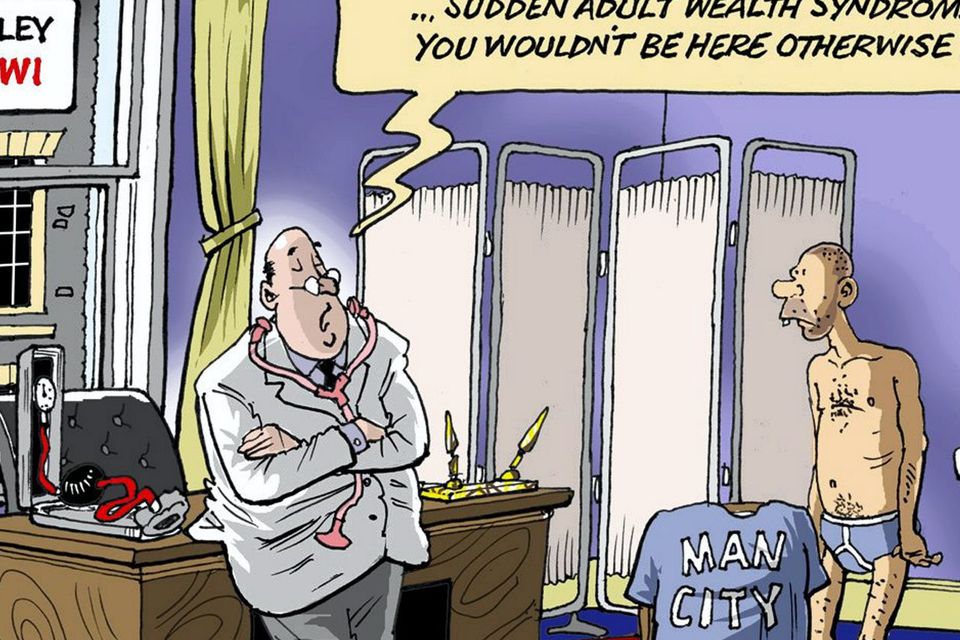Rich City slowly realising that they were happier in poverty
That Was The Week
Where now for Manchester City in their prolonged quest to marry money and happiness?
Since their defeat to CSKA Moscow on Wednesday night, City have had to endure the customary walk of shame, scuttling past the pundits hissing invective, reminding these millionaires that they are indeed millionaires and asking how anyone can play so badly when they are earning hundreds of thousands of pounds a week.
I've always wondered how anyone can play football at all when they earn a million pounds a month and I remain impressed by this, especially as it usually means they have managed to turn up for training nearly every morning, something I'm pretty sure I'd have struggled to do if I was a millionaire in my 20s or, simply, in my 20s.
But, for once, there may be something in the analysis of City as a club that is struggling to find meaning when they can have it all, within the limits set by Financial Fair Play regulations. In fact, it may be that the Premier League is suffering from a collective indolence. Could we have reached the tipping point, the moment when the great wealth rightly bestowed on footballers led not to the pursuit of excellence but to a shrug, a feeling that there must be something better to do?
Gary Neville's excellent analysis on the end of defending made no mention of money, but it is hard to imagine modern footballers happily subjecting themselves to the methods George Graham employed at Arsenal in an attempt to better themselves collectively.
David Luiz, for example, would probably object to being tied to a rope which was attached to other members of his back four, even if he is the player who would benefit most from being tied to his team-mates by rope.
Instead there are so many teams who pay lip service to the great ideas of defending but then decide they'll go at it a different way, a way more in keeping with the freedom that great wealth brings.
Last weekend, Noel Gallagher said that Rickie Hatton was one of the Manchester City fans who preferred things in the old days, the days when they were poor and they knew where they stood.
City have had to embark on a process of reinvention far more extensive than Chelsea's. It wasn't hard for Chelsea to adapt to the concept that they would now have everything. It was something they had been conditioned to believe for a long time. They were the club that was made for the stars on the King's Road. They had a desirable location so Roman Abramovich's arrival was only a correction. When he bought Chelsea, he heralded the transformation not only of football but of London as an arena for the super-rich.
Jose Mourinho then came along and created the necessary fiction that they weren't a club which had everything, they had nothing and if they weren't careful it would be taken from them.
Graham also warned that a club should never sign a player "who thinks he's doing you a favour by signing for you". Mourinho ensured that the players who arrived at Chelsea never felt that way.
He did this by being so captivating himself that it seemed natural that people would want to be close to him. Mourinho was the star, he had the charisma and essentially the sexual energy that drew people towards him and it was this force which has always distinguished him from, say, Neil Warnock.
Mourinho turned something which could have been seen as ersatz into a happening. Chelsea was the place to be until he decided it was no longer the place to be.
City have struggled to make that leap, even when Roberto Mancini was the figurehead. Mancini could attract attention but such is the subtle way of these things, it transpired that his ego was different to Mourinho's ego and his players tired quickly of his version. Manuel Pellegrini brought stability and there was a peace dividend but football clubs might need something more to succeed. Maybe they don't work well as an oasis of serenity.
Once again there is said to be no panic from Sheikh Mansour. City's chairman Khaldoon al-Mulbarak is reportedly 'calm' about the situation.
There is something noble about this position even if City resemble a patrician father who is considered one of society's most civilised men, hailed for his grace and noted for his manners but who, when his children turn out to be less well-mannered and not quite as graceful, starts fiddling uncomfortably with his tie before returning to discussing Titian's methods.
In the 1990s, psychologists identified a condition they called Sudden Wealth Syndrome which they say afflicted those who come into a great deal of money very quickly, or inherit it. Those who are suffering from it experience some of the following - increased anxiety, irritableness, paranoia about being exploited and confusion about their identity.
As the City fans sang their songs claiming persecution by UEFA, it was easy to see how quickly this condition takes hold. Where once they found consolation in irony, they have no need for that any more.
Humour is historically the resource of the weak. The bullied and the victimised have always used wit to get themselves out of threatening situations or to overcome superior forces. Then they achieve things themselves and they no longer have to be ironic. Looking at the modern City is like looking at the modern Chevy Chase and marvelling that they were once funny guys.
They have no need for that stuff these days, not when they are the mightiest of the mighty. In fact the only thing that can stop them is the unfair procedures of UEFA and FFP, an imperfect attempt at regulation and one which, as City fans will argue, impedes the ambitions of clubs anywhere.
Of course they speak from self-interest rather than an altruistic desire to see other clubs transform themselves with the help of an oil billionaire. City have their great wealth and yet they have found that something is still bugging them. They are rich, they can't be dissatisfied so it must be something else - it must be UEFA or CSKA or the referee. There must be some way of shaking this constant feeling that money can't remove.
dfanning@independent.ie















